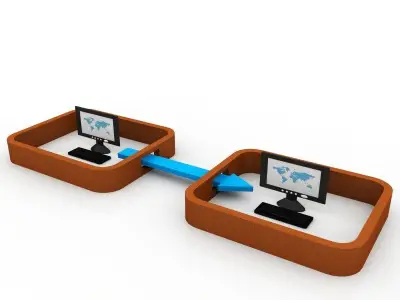The market for mergers and acquisitions (M&A) requires secure and reliable technology to make the process efficient and easy. Any business engaging in this market needs a platform to share their information and carry out due diligence. The virtual data room (VDR) has had a massive impact on this step in M&A transactions, but it wasn’t always this easy:

Physical data rooms
In the past, buyers and sellers would have to arrange a meeting at a pre-determined location that’s now become known as a physical data room. While here, the sellers would present the hard copies of business documents. The buyers had an allocated time to view these confidential company files and make a decision on whether or not to invest.
Seller and buyers were required to meet face-to-face, which meant that both parties could incur considerable travel and accommodation costs if they were based in different parts of the world. Multiple deal rooms and meetings had to be scheduled one after the other, and the seller’s representative had to be onsite to ensure the confidential information wasn’t being copied. Any form of photocopying need to have prior approval before the meeting took place.
Virtual data rooms (VDRs)
As the years went on, VDRs became the industry standard for sharing sensitive information. They’re fast, efficient, cheap and more convenient. But how do they work?
When engaging in the M&A process, a company will seek the expertise of VDR provider. Organizations like Imprima provide virtual data room services for companies of any size. The VDR provider will then host the seller’s confidential company files in a secure online repository. This web-based platform will usually be protected by encryption on the same level as banks and adhere to respective data protection laws for different countries.
All the interested buyers are given unique log-in credentials, so that they can access the company files at their leisure.
Benefits for sellers
The old method of physically gathering, printing and organizing financial documents is no longer necessary. Now, sellers can simply upload the digital copies of these documents to the VDR with minimal effort. They just need to ensure that all the files are properly named and organized.
To maintain the anonymity of the interested buyers from one another, a seller previously had to hire separate rooms and intelligently schedule the meetings. A VDR eliminates this headache by allowing buyers to view the files online 24/7, without ever knowing who else is also looking at them.
Sellers are also provided with ability to control who can see what information and how long for. Restrictions can be applied to prevent the files from being copied, printed or forwarded.
Benefits for buyers
A web-based platform means that buyers don’t have to waste time and money traveling to a physical location. This speeds up the negotiation process considerably.
A VDR also provides an ease-of-use benefit that the physical room could never provide. Buyers don’t have to painstakingly sift through unorganized documents in order to find the information they need.
[Image credit: sheelamohan, FreeDigitalPhotos.net]

Hi Peter Lee,
The concept of VDR is really impressive. I have personally observed that the M&A meeting is common even nowadays also. In such cases, arranging a Physical Data Room is a tedious task for the companies, as some time it becomes very difficult for both the parties (buyer and seller) to fix a place that is suitable to both of them. Through VDR, no one need to travel physically, rather they get a more secure and user friendly environment even at their work places.
Secondly, its more safe, reliable and time saving process. The parties can use this online service any time under better controlled system and even presence of both the parties at the same time not necessary.
Thanks for this useful information.
VDR is quite a smart move as it cross-applies encryption and privacy onto your files, something that is only commonly in data storage for big businesses. You do need a trustworthy VDR host, but once that’s out of the way, you can communicate with ease! Thanks for sharing your thoughts, SK. Hope to see you around.
Virtual rooms are becoming more and more mainstream and the benefits are great. Thanks for bringing this out.
Hi Peter,
The idea of a VDR is a little bizarre to me, because I am used to face to face meetings. I do know that they can be great for certain products, but some products that a seller is trying to sell would be better presented face to face. Anyways, that’s just what I think. Thanks for sharing what you think,
Andrew
I like the concept of VDRs. People are always on the go, are generally busier and do not have the time to have face to face meetings based on travel time. They are convenient and definitely the future.
I have found that having a good virtual data room can make a small business seem much more adept at it’s job and it can effectively take on bigger companies that used to be dominant in their field. It’s like a second office and a much more powerful backup system than we had originally.
VDRs are quite useful for business operations. It’s a good way to reduce paperwork and send/receive confidential material.